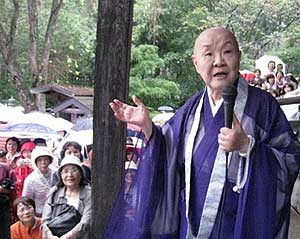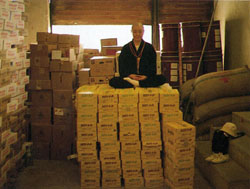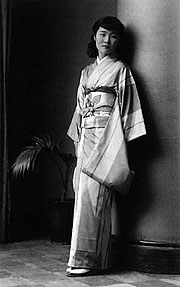Living high: living deep
By ERIKO ARITA, The Japan Times, Oct 5, 2008
Jakucho Setouchi — a most unlikely nun
Joboji, Japan -- It was pouring down with rain, but in early September thousands of people thronged inside and outside a temple in Joboji, in Japan's northeasterly Iwate Prefecture, to listen to a sermon by Jakucho Setouchi.
 << Crowd-pleaser: Jakucho Setouchi addresses a multitude from all over Japan who gathered in the rain last month at the Tendaiji Temple in Joboji, Iwate Prefecture, where the Buddhist nun was the chief priest from 1987 to 2005. ERIKO ARITA PHOTO
<< Crowd-pleaser: Jakucho Setouchi addresses a multitude from all over Japan who gathered in the rain last month at the Tendaiji Temple in Joboji, Iwate Prefecture, where the Buddhist nun was the chief priest from 1987 to 2005. ERIKO ARITA PHOTO
As a Buddhist nun, and one of the most popular writers in Japan, it was Setouchi's remarkable insight on life, her humor and her eloquence that had drawn so many to listen to her words of wisdom whatever the weather.
"We don't know when we're going to die," 86-year-old Setouchi told the assembled masses. "But we must live our lives to the full every day without any regrets. Eat and drink what you want — and if you have someone you love, go and tell them that you love them.
"But if you love your neighbor's husband, she will be hurt. It is nearly impossible for you to be happy while hurting others. I think many of you have done such things, and I also did them so many times," she said with a laugh.
In those few words, this small, elderly nun brimming with energy gave a big hint as to the colorful and rather dramatic life she has lived.
Known as Harumi Setouchi before becoming a nun, she was born in Tokushima Prefecture on the southern island of Shikoku in 1922. She studied Japanese literature at Tokyo Women's Christian University and married at 21. Then she moved to Beijing, where her husband's work took him, and gave birth to a daughter there. After World War II ended in 1945, the family returned to Japan, but before long she fell in love with a young man and, at age 26, abandoned her husband and child . . . so embarking on a particularly passionate phase of her life.
As well, Setouchi also began writing novels in the 1950s, and at age 35 won a literary prize for "Joshidaisei Chu Ailing (Woman University Student Chu Ailing)." Though her next novel, "Kashin (Flower's Core)," was branded as pornography by some critics, in 1963 she was awarded the prestigious Woman's Literature Prize for "Natsu no Owari (The End of Summer)," in which she describes her quadrangular relationship with her ex-boyfriend, her lover and his wife.
But then, astonishingly — while busily writing novels and essays — Setouchi became a Buddhist nun at the age of 51.
At age 70 she received one of Japan's top literary awards, the Junichiro Tanizaki Prize, for "Hana ni Toe (Ask the Flower)," which is based on Ippen, the founder of the Ji sect of Buddhism, and in 2006 she added the International Nonino Prize for her novels and activities as a Buddhist nun.
But Setouchi is not only a novelist. She is an activist, too.
 Needs-easer: Setouchi meditates while sitting on relief goods for Iraq piled in a warehouse of the Red Crescent Society in Amman, Jordan in April 1991. AKIO HAGA >>
Needs-easer: Setouchi meditates while sitting on relief goods for Iraq piled in a warehouse of the Red Crescent Society in Amman, Jordan in April 1991. AKIO HAGA >>
In 1991, she went on a hunger strike against the Gulf War; then she took humanitarian supplies to Iraq; and then, after 9/11, she paid for an advertisement in a national newspaper condemning the invasion of Iraq. In addition, Setouchi is also a forceful opponent of capital punishment — which Japan still allows — and has corresponded with some of those on death row.
This year, however, is particularly busy for Setouchi, who has now published nearly 400 books and continues writing, appearing on TV and speaking at temples. That's because this year marks the 1,000th anniversary of "The Tale of Genji" by Murasaki Shikibu — often hailed as the world's first novel — and Setouchi, whose modern Japanese translation was published in 1996, has been lecturing on "Genji" all over Japan for several months now.
Despite her rigorous schedule, however, Jakucho Setouchi made time to talk to The Japan Times before delivering her sermon that rainy day in Iwate last month.
In a recent biography of you by Shinji Saito, he says that as a writer you are following in the footsteps of the female French philosophers Simone Weil or Simone de Beauvoir. What do you think of that?
It's a bit of an exaggeration, but maybe he said that because I have not just written books but have also faced social problems in my life. In that respect, I think my actions have been different from other writers.
Two years ago, I received the International Nonino Prize in Italy, even though I'd never heard of it until I was chosen. I believe I got the prize because of my activities to do with social problems as well as for my writings.
One person on the judging panel for that prize was V.S. Naipaul, winner of the Nobel Prize for Literature in 2001. I heard that he read your novel "The End of Summer" in English. In that book you wrote about your quadrangular relationship with your lover, Jinjiro Oda, his wife and your ex-boyfriend. What made you write about such a difficult, complicated experience?
I didn't have any special idea, but I just wrote about the most important problem in my mind to be solved at that time. It was a complete "I" novel. This is a method of writing about the author's own life experience honestly, which is a specialty of Japanese literature. I have written many "I" novels.
Apart from me, nobody writes really honestly about their own experiences. Nobody writes about their most embarrassing things or things they never want others to know. By writing "I" novels, I can reflect on what I have done from an objective point of view — a viewpoint I didn't actually have during those events.
By writing the novels, I can realize if I have done a stupid thing or what I should have done. Although a human being may try to live life to the full every moment, life cannot always be perfect. That's all right, I think.
For the eight years you dated Oda he was spending his time at your place and also at his family home. What did you gain through your relationship with him?
I learned about literature from him, and the difference between great literature and the rest. He expressed it as literature's spirit being high or low. If I hadn't met him, I wouldn't have my life as a literary person now. I owe my life to him.
While living with Oda, you also met your ex-boyfriend again and started seeing him, too. What kind of person was he?
He was a student of my ex-husband who had been teaching in a junior high school in Tokushima Prefecture before we moved to China. Now I realize it was immature love . . .
I was not so unhappy in my life with my ex-husband. But it was during the war, and while struggling to overcome that extraordinary situation, I realized what was his real personality and that he had different values from me. That gave me a very uneasy feeling — and then I met the young man.
But I think there is no reason why people fall in love. It's like lightning. You don't know when it's coming and you can't avoid it even though you may get injured or die. I think that is what falling in love is like.
What led you to start writing novels?
I wanted to be a novelist. But when I entered university, I found that many students had talents on the same level as mine. So I thought I was wrong to want to be a novelist and I decided to marry. I married by arrangement. My ex-husband was trying to be a scholar, so I believed it would be wonderful to help him instead of developing my own talent . . .
But when I lived in Beijing, I went to a bookstore selling Japanese books and found a novel titled "Ningyoshi Tenguyahisakichi (Doll Craftsman Tenguyahisakichi)" by Chiyo Uno. The main character was the craftsman named Tenguya, who made traditional deko dolls in my home area of Tokushima. Uno, who had seen the dolls, was fascinated by them and visited the craftsman to ask him about his trade. The words in the novel were in the beautiful Tokushima dialect, and I think the novel is a masterpiece.
When I was absorbed reading that book, I thought again that I should have become a novelist. Then I returned to Tokushima after the war, and my ex-husband's students and I formed an interesting group in which we wrote novels in our notebooks and passed them round to read. The leader of the group was the man I fell in love with.
 << Eye-pleaser: Harumi Setouchi (Harumi was her name before she became a nun) at age 20 in 1942 in a photo to be shown to prospective arranged-marriage partners. NAGAO SHOBO
<< Eye-pleaser: Harumi Setouchi (Harumi was her name before she became a nun) at age 20 in 1942 in a photo to be shown to prospective arranged-marriage partners. NAGAO SHOBO
After falling in love, didn't you leave your husband and daughter and go alone to Kyoto?
My ex-husband was childish even though he was nine years older than me. The more he tried to be good to me, the more it drove me to love the youth. But my husband was not to blame. My love was a bolt from the blue for him. I feel sorry for him.
How did the sacrifice of abandoning your family affect your life after that?
Generally, I never regret whatever I have done. I think that's OK, because I did my best at each moment of my life. But leaving my child is my only and my biggest regret.
Now I sometimes see my daughter and grandchild, but I gave her great pain. She has never blamed me. Though I fear nobody, I am afraid of my daughter. I have written about my feelings toward her, but she didn't like it and told me not to mention that anymore.
Did you start writing novels in Kyoto?
There I worked at a publishing house and at Kyoto University's hospital. Then I started to write novels for girls. I sent them to a publisher and they all got published, so I thought it was a good business for me and I decided to quit the jobs and go to Tokyo.
I made a living writing novels for girls, but I was not satisfied and wanted to write novels for adults. So I joined a literary coterie named Bungakusha (literary man) led by Fumio Niwa. In the coterie, I met Jinjiro Oda. After that I wrote a novel titled "Joshidaisei Chu Ailing (Woman University Student Chu Ailing)," which got the award for coterie novels from Shinchosha Publishing Co.
After that, I wrote a novel titled "Kashin (Flower's Core)," but many people misunderstood it and criticized me and said, "You buttered up the literary world with eroticism." I was so surprised.
I read it but I didn't think it was too erotic.
Right! I described sex in a more elegant manner than young writers nowadays. I wrote in the novel that spirit is more important than body — but people paid most of their attention to the body descriptions and criticized it.
I should have stayed quiet, but I was so upset and responded to that criticism, saying, "Those who criticize the novel should be impotent and their wives should be frigid." (laughing). Because of that remark, all the literary magazines refused to publish my novels for five years. But the setback helped me to grow and I am here now.
Why did you decide to write biographical novels about passionate women in modern Japan, including "Bi ha Rancho ni Ari (Beauty in Disarray)" on Noe Ito (1895-1923), who was involved in the early feminism movement?
Before that novel, I wrote about Toshiko Tamura (1884-1945), who was the first female novelist to make her living by writing. Before Tamura, Ichiyo Higuchi (1872-96) was writing novels in the Meiji Era, but her works were not recognized during her short life and she never managed to make her living by writing.
Tamura was a very interesting woman. She became a popular novelist, earned a lot of money, lived a luxurious life and had an affair with a married man. The couple went to Canada and lived there for 18 years. After coming back to Japan, Tamura tried to write novels again, but she could not. Then she visited Beijing and eventually lived there, but she died in Shanghai . . .
There are many legends and misunderstandings surrounding her life. So, as I have also been misunderstood by people, I was curious about her life and wrote about it. I was encouraged by the good feedback, and I continued to write novels about women.
When Tamura was alive, a group of women led by the feminist Raicho Hiratsuka (1886-1971) launched a magazine titled Seito (Bluestocking) that reflected the awakening identity of modern Japanese women. Researching Seito, I came across Kanoko Okamoto (1889-1939), who seemed interesting and was involved in publishing the magazine — so I wrote a novel about her titled "Kanoko Ryoran (Profusely Blooming Kanoko)."
The women you wrote about were active in writing. They were also passionate about their loves, weren't they?
I believe youth should live for loves and revolutions, though in Japan revolutions have disappeared. For me, Noe Ito is the symbol of love and revolution. The men who loved her were all attractive. Researching her was a very interesting process.
The lives of the women seem similar to yours, don't you think?
Their lives were more passionate than mine.
In your essay "Basho (Place)," which won the Noma Prize for Literature in 2001, you wrote, "I started to have awareness that I was in the later stage of my life in my early 40s, which seemed to lead to an adoration for death." You also wrote, "Becoming a nun and going wandering is my deepest aspiration and it tempts my heart every day and night." Why do you think you had such powerful feelings?
I don't know. I was dreaming of going wandering.
Why did you "adore" death and become nun?
It stemmed from the idea of going wandering. In Japan, people who became monks or nuns used to go wandering and preach sermons, as Buddha preached while traveling. Famous Buddhist priests like the poet Saigyo (1118-90), the founder of the Ji sect of Buddhism, Ippen (1239-89) and the poet Ryokan (1758-1831) did that. They also created excellent literature while traveling. I admired them so much.

 << Crowd-pleaser: Jakucho Setouchi addresses a multitude from all over Japan who gathered in the rain last month at the Tendaiji Temple in Joboji, Iwate Prefecture, where the Buddhist nun was the chief priest from 1987 to 2005. ERIKO ARITA PHOTO
<< Crowd-pleaser: Jakucho Setouchi addresses a multitude from all over Japan who gathered in the rain last month at the Tendaiji Temple in Joboji, Iwate Prefecture, where the Buddhist nun was the chief priest from 1987 to 2005. ERIKO ARITA PHOTO Needs-easer: Setouchi meditates while sitting on relief goods for Iraq piled in a warehouse of the Red Crescent Society in Amman, Jordan in April 1991. AKIO HAGA >>
Needs-easer: Setouchi meditates while sitting on relief goods for Iraq piled in a warehouse of the Red Crescent Society in Amman, Jordan in April 1991. AKIO HAGA >> << Eye-pleaser: Harumi Setouchi (Harumi was her name before she became a nun) at age 20 in 1942 in a photo to be shown to prospective arranged-marriage partners. NAGAO SHOBO
<< Eye-pleaser: Harumi Setouchi (Harumi was her name before she became a nun) at age 20 in 1942 in a photo to be shown to prospective arranged-marriage partners. NAGAO SHOBO